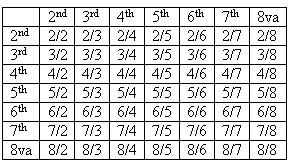Scroll through the lesson and click on notation/video/audio links to load the interactive players.
Please subscribe to get full access to all lessons for only $7.95/month PLUS 1 week free trial.

Riff Interactive lessons are
LESS expensive and
MORE interactive than alternatives!
More Info
|
|
Lesson Subject

Lesson Jam Track
Teacher: Hi guys. Tonight I will recap of one of
my favorite lessons on intervals
Teacher: Tonight's concept was presented to me by
Mike Miller, a great jazz-rock guitarist. Played with Chick Corea,
Yellowjackets. Pretty rockin and intelligent too.
Teacher: The jam track is a vamp of A to D, with
an a bass note throughout.
Jam Track Riff
Teacher:
Tonight's licks are presented in the key of A major
A Major
Scale
horse: how do you know Mike
Miller?
Teacher: I attend school where he
taught in L.A.
Teacher: We will take a familiar scale,
like the Major, and work through it in interval
combinations
Teacher: To review, the distance from a note of
the scale to the next is called a '2nd' interval.
Teacher: or from one note of the scale to its
next closest neighbor
Teacher: Skipping two notes ahead gives a '3rd'
interval.
2nd-2nd Interval
Pattern (up-up)
Teacher: The
combination we're starting with is going up a 2nd, then another 2nd. Producing a
three note phrase
Teacher: This pattern is started on the first
note of the scale. Then played off the next note and so on up the
scale
Teacher: This interval pattern could start an
octave higher and we could take it down the scale
2nd-2nd
Interval Pattern (up-down)
corey:
hmm
Teacher: Notice I try to use the same fingering.
But this introduces some combinations that will tend to trip up the
fingers
Teacher: We
could also take our interval pattern and reverse the order of the notes. Up the
scale...
2nd-2nd
Interval Pattern (down-up)
Teacher: And finally
descending pattern, descending through the scale.
2nd-2nd
Interval Pattern (down-down)
Teacher:
This is a popular 'sequence' you may have heard many
times
Teacher: So try to workout the upcoming patterns
these four ways.
jarquiette: those 9 - 5 's are quiete a
stretch
Teacher: Hurts so good. And they look great in
pictures!
Connelly: Very
True
horse:
lol
Teacher: 1. Intervals going up, line going
up
Teacher: 2. Intervals going up, line going
down
Teacher: 3. Intervals going down, line going
up
Teacher: 4. Intervals going down, line going
down
Mike: I
like the down up pattern
Teacher: Lets get more stetches and a more open
sound with wider intervals.
Connelly: Sounds Great
Teacher: This time we keep the 2nd interval to
start, but then jump up a 3rd. Goes like this
2nd-3rd Interval
Pattern
Teacher:
OK.
Mike: This looks like an
arpeggio to me
Teacher: Some of the patterns end up outlining
chords. And there will be a similar sound at times to an
arpeggio.
Teacher:
Hang with the idea. You will see some totally new patterns. Remember to work
these out in all four patterns.
Teacher: Now a 2nd + a
4th
2nd-4th Interval
Pattern
Teacher: These
introduce some tricky fingering combinations. Part of the usefulness of working
these out
Teacher: Or how about next. A 2nd + 5th
combo
2nd-5th
Interval Pattern
Teacher:
A 2nd + a 6th
2nd-6th Interval Pattern
Teacher:
2nd + 7th anyone?
2nd-7th Interval Pattern
Mike: Wow your
covering a lot of ground
pagefan: Go for
it!
Mike: String
skips, I love it
Teacher: Alright. 8ths are
enough.
2nd-8th
Interval Pattern
pagefan: What? No
9ths?
Teacher: Well, how about let's change the
starting interval.
3rd-2nd Interval Pattern
Teacher:
You could go higher if you dare...
Teacher: But now we could work
out to 3rd+3rds. 3rds+4ths
jarquiette: What's the primary application for
these?
Teacher: It
has a couple of useful applications
Teacher: First it is a new way to think of note
patterns or 'sequences'.
Teacher: Next, these will lend a more 'open'
sound to your playing. Less scalar
Teacher: And if you think you can blaze through
your major scales at 200 BPM on the metronome try working out to some of these
patterns
Mike: I
tend to rut in scale patterns so this is useful
jarquiette: I can definately use that - my soloing tends
to sound scaley
Teacher: Try working these up to triplets to the
jam track. About 100 Beats Per Minute
Teacher: What we might end up with is a chart
that looks like this
Mike: This is an awsome way to
learn.
Interval
Patterns Table

Teacher: We worked through the top row of 2nd
interval patterns. 2nd+2nd, 2nd+3rd, and so on. 8va means
octave.
Teacher: Now
try the 3rds row. Try a new one or two each day.
Teacher:
all four ways of working the pattern. Especially the one that seems more
difficult.
Teacher:
And the ones you like the sound of
Teacher: Then work out other scales with the same
ideas. Another good choice for the jam
track
A Mixolydian
Mode
Teacher:
Great. Got to run. Have fun. Take it a little at a time.
Connelly:
Thanks For the help
Stratman: great
Mike: Thanks, will go to the archive and use the jam
tracks on this.
|
<< load notation from left
|
|
<< load audio from left
|
<< load audio from left
|